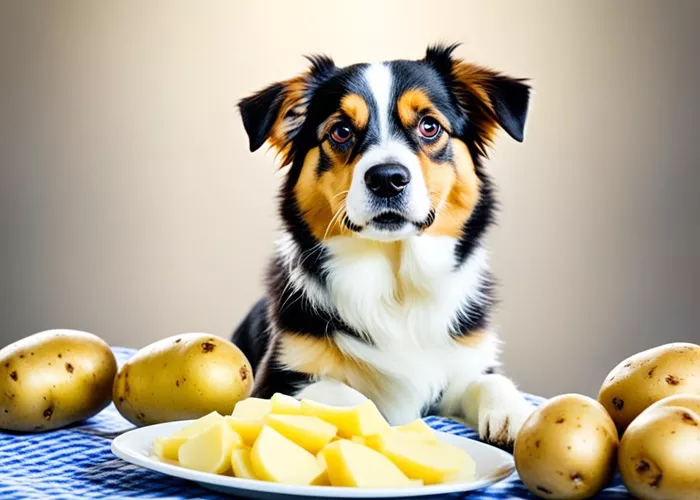When it comes to sharing food with our furry friends, it’s essential to know what’s safe and what’s not. One common question that dog owners often ask is, “Are baked potatoes safe for dogs to eat?” The answer isn’t a simple yes or no. While baked potatoes can be safe for dogs in moderation, there are several factors to consider before offering this starchy treat to your pet. In this article, we’ll explore the safety of baked potatoes for dogs, their nutritional benefits, potential risks, and how to prepare them properly.
Nutritional Value of Baked Potatoes for Dogs
Potatoes are a good source of several essential nutrients that can benefit dogs. They are rich in carbohydrates, which provide energy. They also contain vitamins like Vitamin C and B6, which support the immune system and brain function. Additionally, potatoes offer minerals such as potassium, magnesium, and iron, which are important for muscle function and overall health.
However, it’s important to note that dogs have different nutritional needs than humans. While potatoes can be a healthy addition to a dog’s diet, they should not replace a balanced dog food that meets all their dietary requirements.
Potential Risks of Feeding Baked Potatoes to Dogs
While baked potatoes can be safe for dogs, there are some risks associated with feeding them to your pet. One of the main concerns is the presence of solanine, a toxic compound found in green potatoes and potato sprouts. Solanine can cause gastrointestinal upset, lethargy, and even more severe symptoms like tremors and seizures in dogs.
Another risk is the addition of toppings or seasonings. Many people enjoy baked potatoes with butter, sour cream, cheese, or salt. These additions can be harmful to dogs. Butter and sour cream are high in fat, which can lead to pancreatitis in dogs. Cheese can be difficult for some dogs to digest, and excessive salt can cause sodium ion poisoning.
How to Safely Prepare Baked Potatoes for Dogs
If you decide to share a baked potato with your dog, it’s crucial to prepare it safely. Here are some tips:
Choose the Right Potato: Always use fresh, ripe potatoes. Avoid green potatoes or those with sprouts, as they contain higher levels of solanine.
Cook Thoroughly: Bake the potato until it’s fully cooked. Raw potatoes are harder for dogs to digest and may contain more solanine.
Avoid Toppings: Serve the potato plain, without any butter, sour cream, cheese, or salt. These additions can be harmful to your dog.
Cut into Small Pieces: Cut the baked potato into small, bite-sized pieces to prevent choking and make it easier for your dog to eat.
Moderation is Key: Offer baked potatoes as an occasional treat, not a regular part of your dog’s diet. Too much potato can lead to weight gain and other health issues.
Can Dogs Eat Sweet Potatoes?
While we’re on the topic of potatoes, it’s worth mentioning sweet potatoes. Sweet potatoes are often considered a healthier alternative to regular potatoes for dogs. They are rich in fiber, which aids in digestion, and contain vitamins like Vitamin A, which supports vision and immune health.
Sweet potatoes are generally safe for dogs when cooked and served plain. However, as with regular potatoes, moderation is essential. Too much sweet potato can lead to digestive issues and weight gain.
Signs of Potato Toxicity in Dogs
It’s important to be aware of the signs of potato toxicity in dogs, especially if you suspect your dog has consumed green potatoes or potato sprouts. Symptoms of solanine poisoning include:
- Vomiting
- Diarrhea
- Lethargy
- Tremors
- Seizures
If you notice any of these symptoms, contact your veterinarian immediately. Early intervention can prevent more severe health issues.
Alternatives to Baked Potatoes for Dogs
If you’re looking for safe and healthy alternatives to baked potatoes, consider the following options:
Carrots: Carrots are low in calories and high in fiber and vitamins. They make a great crunchy treat for dogs.
Green Beans: Green beans are a good source of vitamins and minerals. They can be served raw or cooked, but avoid adding salt or seasonings.
Pumpkin: Plain, cooked pumpkin is rich in fiber and can help with digestive issues. Make sure to use plain pumpkin, not pumpkin pie filling, which contains added sugars and spices.
Apples: Apples are a good source of vitamins A and C. Remove the seeds and core before offering them to your dog.
Consulting Your Veterinarian
Before introducing any new food into your dog’s diet, it’s always a good idea to consult your veterinarian. They can provide personalized advice based on your dog’s age, breed, weight, and overall health. Your vet can also help you determine the appropriate portion size and frequency for treats like baked potatoes.
Conclusion
In conclusion, baked potatoes can be safe for dogs to eat when prepared properly and served in moderation. They offer some nutritional benefits but should not replace a balanced dog food diet. Always avoid green potatoes, potato sprouts, and any harmful toppings or seasonings. If you’re unsure about feeding baked potatoes to your dog, consult your veterinarian for guidance.
Remember, every dog is different, and what works for one may not work for another. Pay attention to your dog’s reactions and adjust their diet accordingly. By taking these precautions, you can safely share a baked potato with your furry friend and ensure they stay happy and healthy.
Related topics:
Can You Feed Pitbulls Human Food Safely?
What Is the Ideal Diet for Large Breed Dogs?
How Can I Transition My Dog to a Healthy Diet?


